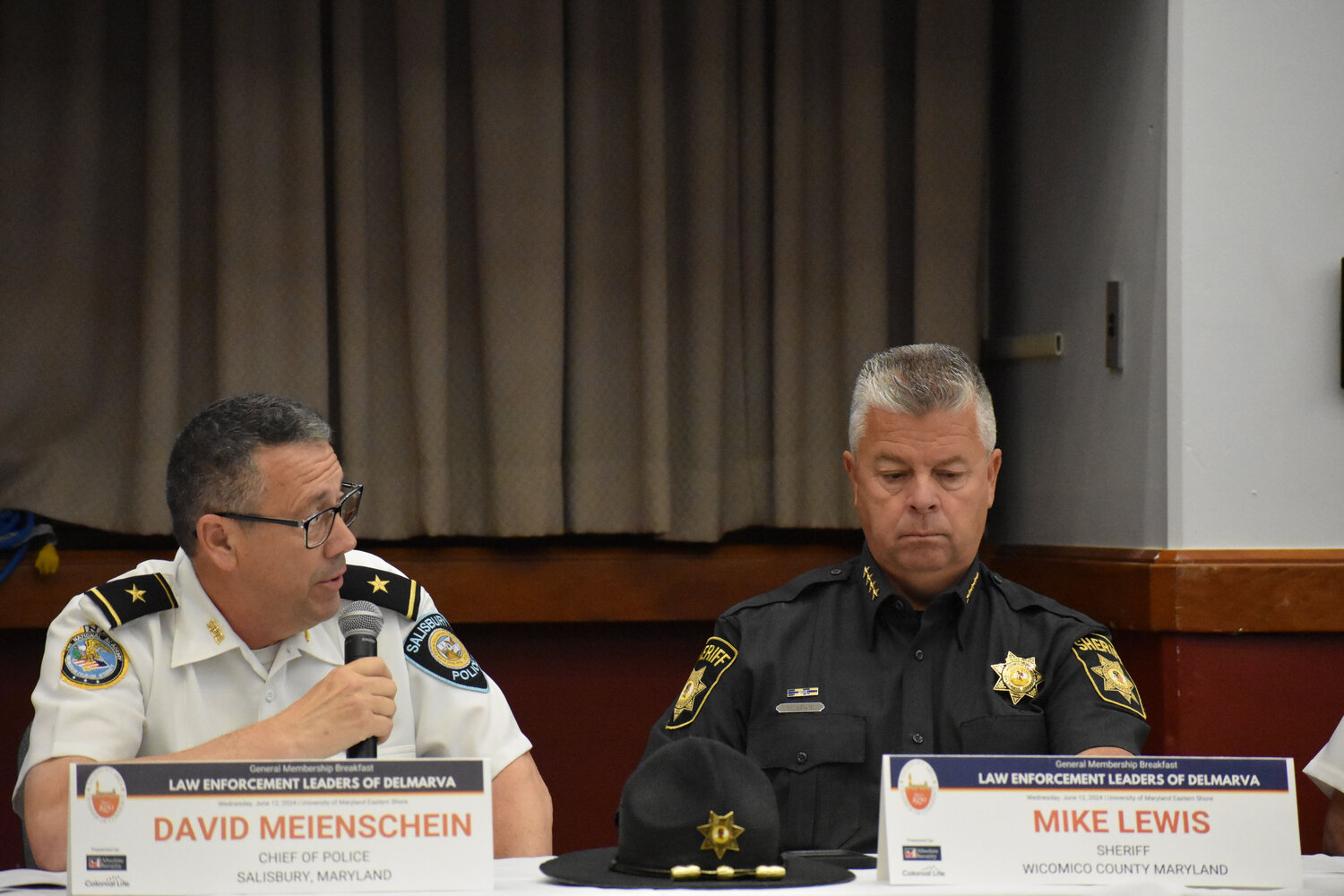Delmarva law enforcement leaders discuss profession at chamber forum
PRINCESS ANNE — Delmarva law enforcement leaders face many challenges that their counterparts across the United States also see.
A recent forum on the University of Maryland Eastern Shore …

You must be a member to read this story.
Join our family of readers for as little as $5 per month and support local, unbiased journalism.
Already a member? Log in to continue. Otherwise, follow the link below to join.
Please log in to continue |
Delmarva law enforcement leaders discuss profession at chamber forum
PRINCESS ANNE — Delmarva law enforcement leaders face many challenges that their counterparts across the United States also see.
A recent forum on the University of Maryland Eastern Shore campus brought them together to discuss public confidence in law enforcement, juvenile crime and police recruitment, retention and morale.
Those were just some of the topics discussed during the inaugural Law Enforcement Leaders of Delmarva Forum by the Salisbury Area Chamber of Commerce on June 12, featuring the leaders of nine Eastern Shore police agencies.
Nearly one hundred business, government and organizational leaders gathered for the event presented by Absolute Security Group Security Group and Colonial Life.
Wicomico County State’s Attorney Jamie Dykes, who moderated the forum, asked the Delmarva police leaders for their thoughts on public confidence in the industry at a time when social media users require instant news.
Wicomico County Sheriff Mike Lewis said they have a big responsibility as leaders, to not only get things right but report things accurately.
“I hear oftentimes from the community that they feel that they do have confidence because they see me front and center,” Lewis said. “It’s important, I think, that our community members see us out there, men or women, out in the trenches getting the job done.”
But Fruitland Police Chief Krah Plunkert noted that the public needs to understand that there are times when they can’t release information “instantly” because it is “sensitive” to ongoing investigations.
Juvenile crime
Cambridge Police Chief Justin Todd said during the forum that juvenile crime has recently “spiked” in his city of more than 13,000 residents.
“Last year our car thefts alone doubled by about 275 percent,” Todd said. “A lot of the children that we were finding doing these types of crimes were eleven to twelve-year-old kids.”
Todd said gang members solicit the minors to do the crimes because most of the time there is little repercussion.
“That’s been a tough battle for us to try and overcome and deal with,” Todd said.
The Delmarva police leaders said they use many methods to combat juvenile crime, including working with state agencies, getting families resources and utilizing school resource officers.
Salisbury Chief of Police David Meienschein said you can’t always arrest your way out of the problem.
Meienschein said families need to be involved in combatting the issue. In one recent incident, he notified a grandmother who was unaware of what was occurring in the neighborhood by her family member.
“Some cases the kids realize, ‘I’m not worried about the police, but I am worried about the grandma.’”
Sheriff Lewis said they have a very strong school resource officer program in Wicomico County that prevents a lot of crimes from happening while solving many crimes across the region.
“If it weren’t for the ten school resource deputies or any supervisor that we have in the schools in Wicomico County, we’d never know how many crimes we prevent simply by having those deputies in our schools,” Lewis said. “The overwhelming majority of our crimes are solved because school resource deputies are not only committed to their mission but they are trusted in confidence by many of those kids in schools.”
Police recruitment, retention and morale
The Delmarva police leaders acknowledged that they simply aren’t getting the recruits they once did and are forced to compete with neighboring agencies within the same applicant pool.
Sheriff Lewis said they are having to adapt to growing trends including tattoos, piercings and evolving police uniforms. He said “anti-police rhetoric” is also turning some off from applying and pay and benefits mean more today than ever before to keep those in the industry.
“We’ve got to look beyond those boundaries, and I think we are starting to turn a corner a little bit, but it is still very challenging to find good applicants today who want to come into this profession,” Lewis said.
Chief Plunkert said that first responders struggle every day with critical incidents that they come upon during their careers.
“Law enforcement officers see 100-150 critical incidents in their career,” Plunkert said. “The average citizen (sees) 1-2 in a lifetime. It’s impacting our first responders.”
Worcester County Matt Crisafulli said a peer support system is key to making sure that men and women are “healthy between the left ear and the right ear so they can provide the services that the public expects and deserves.”
“PTSD unfortunately is alive and well, and it’s not just something you get on foreign lands fighting foreign wars,” Crisafulli said. “It’s our own men and women working in our own backyard that are suffering from this.
"We can’t turn a blind eye to it. We have to make sure that they know that they can come to us and that we can provide that appropriate resource.”
Other leaders participating in the forum:
Maryland State Police Salisbury Barracks Commander – John Revel
Somerset County Sheriff – Ronald Howard
Exmore Virginia Police Chief – Angelo DiMartino
Dover Police Department - Chief Thomas A. Johnson, Jr.
Reach Managing Editor Richard Caines at rcaines@iniusa.org.


 By
By 



